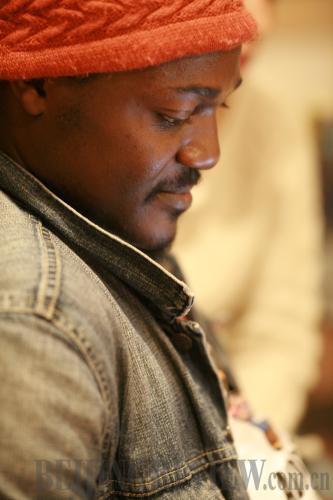|
 |
|
Orou-Yerima Baudouin Euloge (COURTESY OF OROU-YERIMA BAUDOUIN EULOGE) |
As the son of an African diplomat, you lived in China from from 1979 to 1981, and also pursued master courses in directing at Beijing's Central Academy of Drama from 1997 to 2000. Now you're based in Shanghai. What do you make of China's changes over the past 30 years? Are there similar changes happening in Africa?
The changes are great. I feel Chinese people [have] become more open-minded. Back home we also [have] made a great change, but good governance is a new culture in Africa.
After finishing your studies in China you moved to Japan. Why?
My five years' education in China exerted a great influence on my life. Beijing Language and Culture University offered me the chance to meet students [from] around the world. [One], my first Japanese friend Yamamoto showed me the virtue of respect in Japanese culture. I was impressed and interested in it, so I embarked [on] my journey to explore more. [While there], I hosted a Chinese Learning TV program at Japan's NHK television station. There are past unhappy memories between [China and Japan, but] I hope I can do something to promote understanding and bridge the gap.
A movie you acted in, Miracle Banana, was the first Japanese film shot in Haiti. How was that experience?
The movie [is] about a Japanese girl [who] went to Haiti, discovered the poverty and tried to find a solution. [She does this by] making paper from the leaves of bananas [using] Japanese technology. My role in the movie was to introduce Haiti to the girl. Because Haiti and Africa – especially West Africa – share culture and history, we understand them more than any other [place] on the planet.
You've promoted African culture through your work both in China and Japan. Has the reception been different in each place? How?
The reception is deeper in China than in Japan because, politically, Africa and China [have] a tight connection [going back] more than 60 years. The Africa-Japan relationship is still developing. Many Japanese young people have traveled to Africa after [their university] graduation, so more and more Japanese [are learning] things about Africa. [The] Chinese [are more] traditional, and they mainly get to know Africa through African cultural groups.
In 2008, you worked as an official supporter at the Fourth Tokyo International Conference on African Development. What do you think was achieved there?
Many things were achieved. In the past, many African countries didn't talk to Japan, but now Africa has a more affirmative diplomacy with Japan. In the new century, there is war and globalization – "millennium challenges." [At] the conference we set many goals to achieve before 2015. Our politicians are working hard on it. We have elections, democracy, [presidencies], and things are going good now.
The Republic of Benin is not well known in China. As an actor and comedian, how do you see yourself in changing this?
In the past, Benin practiced socialism, so in my heart, Benin and China are brothers. There are many students from Benin studying here in China. I don't think I myself can change things in Africa, but I can work to change things here in Asia, especially in China, my second home. Somebody told me that by being an African in Asia, I was already like an ambassador – ambassador of my culture, history and tradition. It's not a political mission, but a cultural mission. I want to introduce China to Africa, and Africa to China.
What do you think of the Joint Africa Pavilion at this year's Shanghai Expo?
Since most of African history and tradition is oral, we need to find occasions like this to share [our] reality. The Expo gives the Chinese the chance to experience Africa. With one ticket, you will have the chance to visit most African countries. [It's] a great deal.
Learn more about Euloge at www. diamondblog.jp/adogony/ |